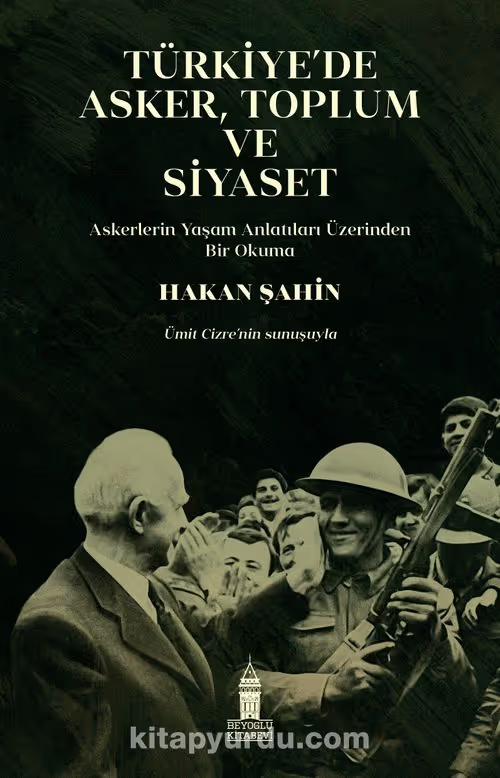
Hakan Şahin. Türkiye’de Asker, Toplum ve Siyaset: Askerlerin Yaşam Anlatıları Üzerinden Bir Okuma. İstanbul: Beyoğlu Kitabevi, 2021.
Civil-military relations have always been one of the main dynamics of Turkish politics, society, and even economics. The military’s influence has risen and declined depending on various conditions, such as structural factors, the international environment, institutional relations, or leadership traits. Yet, the military has always remained an influential institution in Turkey. Hakan Şahin’s Türkiye’de Asker, Toplum ve Siyaset: Askerlerin Yaşam Anlatıları Üzerinden Bir Okuma (Soldier, Society, and Politics in Turkey: A Study on Soldiers’ Life Stories) offers a unique insider perspective on the Turkish military and soldiers’ understanding of the outside world. In this sense, the study fills an important gap in the literature on civil-military relations in Turkey.
The Turkish military’s influence on politics and different areas of life has, of course, been reflected in academic research. Coups and coup attempts, as major turning points, have always attracted scholarly attention. Scholars have widely discussed the dynamics behind coups, such as domestic politics, international conditions, and economic factors that enabled military interventions.
Studies on civil-military relations in Turkey are not limited to coup research. The military was also influential during periods of normal politics. Thus, scholars have examined its secular-Kemalist ideology, its tools for shaping politics, and its role in foreign policy making.
The military has also been a central actor in studies of democracy and authoritarianism. For a long time, it was seen as the main obstacle to Turkey’s democratization. Unelected military officers had the power to impose limits on Parliament, design cabinets, and influence laws. Soldiers’ extrajudicial activities added further pressure on democratic politics. Erdoğan’s authoritarianism, however, reshaped the military’s image, portraying it as an institution that played a check-and-balance role against populist leaders.
Nevertheless, in scholarly works, the military often appears as a homogeneous, monolithic, and timeless institution—an image the soldiers themselves like to project. Accordingly, its ideology, role in politics, image, and policies are often presented as unchanged since the foundation of the Republic. More importantly, this identity is portrayed as being embraced and reproduced by all members of the Turkish military, from senior officers to civil servants. This constructed image appears in both scholarly and journalistic works, whether they are critical of the military or not.
Hakan Şahin, however, introduces the military’s own perspective into the study of civil-military relations in Turkey. He examines how soldiers view democracy, politicians, the military’s role in politics, human rights, and ideologies. Instead of taking the military’s institutional image for granted, Şahin provides a factual discussion of soldiers and military culture in Turkey.
In this discussion, soldier memoirs are Şahin’s main source. Aware of the limitations of relying on memoirs and self-representations, he uses a large repertoire of works written by soldiers of different ranks. Although senior officers are more likely to write memoirs, Şahin’s research also includes a significant number of mid- and low-level officers as well as cadets and privates (p. 75). This not only adds depth to his arguments but also helps the reader understand how social background shapes soldiers’ worldviews.
In line with this, Şahin moves beyond the constructed, monochromatic image of the Turkish military and highlights variations among soldiers. He demonstrates how soldiers’ mindsets and military culture can differ. This shows that many features of the Turkish military (features usually seen as constants) are actually more contested than they appear.
Şahin’s 132 selected memoirs cover a wide period, from Ahmet Muhtar Pasha, an Ottoman general of the 19th century, to well-known figures such as İlker Başbuğ, former Chief of General Staff. This provides a temporal dimension to his arguments. He examines how the military and soldiers changed over time, from the Prussian influence in the late 19th century to the shift toward American influence in the 1950s (p. 201). It shows how domestic, institutional, and international dynamics shaped soldiers’ perspectives, and how soldiers, in turn, influenced these dynamics.
Hakan Şahin’s book fills an important gap in the literature on civil-military relations in Turkey. The nature of these relations has radically changed in the last two decades, especially after the 2016 coup attempt, and they will continue to evolve. Şahin’s book offers a forward-looking perspective on the course of civil-military relations by focusing on soldiers’ viewpoints. It helps us understand soldiers’ expectations from both civilians and the Armed Forces.
The book is written in Turkish, which limits its reach to a wider audience. Even so, Şahin’s work stands out as an indispensable source for understanding the Turkish military, its institutional politics, and its influence on the country’s political life.